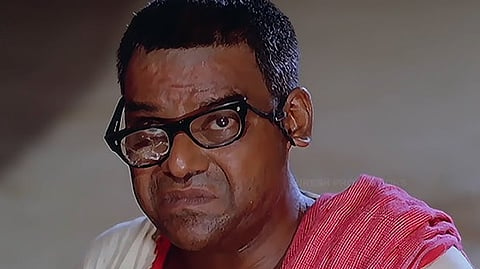

He never needed a monologue. Never needed a backstory. All Kota Srinivasa Rao needed was a minute, sometimes just a line, and he’d turn a routine scene into something bordering on the divine.
He didn’t just act. He inhabited. Like water taking the shape of every vessel, Kota morphed into whatever the story demanded, bringing with him a weight of experience, a smile lined with irony, a glare laced with secrets, and pauses that let the silence throb.
Born in 1945 in Kankipadu, he may have been a bank officer once, but his calling was clearly elsewhere. Debuting in Pranam Khareedu (1978), alongside a young Chiranjeevi, Kota didn’t “rise” through the ranks; he simply appeared to already be there, like a seasoned old soul in a sea of starry ambition.
Over 750 films. Four languages. Every emotion in the book. But Kota Srinivasa Rao’s gift wasn’t just volume. It was precision. Where other actors acted at you, Kota acted with you, turning even the most transactional roles into studies of human nature.
The father, the fraud, the philosopher
To see Kota play a father was to understand that parenting isn’t always loud. In Bommarillu (2006), he was a gentle patriarch who knew when to yield. In Aadavari Matalaku Arthale Verule (2007), he brought a practically tender authority that felt lived-in, never theatrical. In Idiot (2002), his annoyance as Ravi Teja’s father crackled with bemused affection. He didn’t act fatherhood, he understood it, sculpted it scene by scene.
Now pivot to his villains, Kota’s baddies were never generic. They were philosophical. See Athadu (2005), where as a corrupt politician, his end feels less like a punishment and more like karma catching its breath. Or in Sarkar (2005), where he delivered the line "Style South, operation complete North" with a chill so cool, it could freeze lava. His villainy didn’t shout. It smirked in ways that a man truly becomes sinister.
The everyday man of extremes
Kota Srinivasa Rao had this rare talent of taking extremes, greed, lust, anger, delusion, and shrinking them into something heartbreakingly human. In Aha Naa Pellanta (1987), as the iconic miser Lakshmipati, he made you laugh with him, not at him. Petty, yes. But never shallow.
And let’s not forget Money (1993), where he played a role dipped in black humour and portrayed with such joie de vivre that it made cynicism seem like Greek epic. It was as though Kota knew the tragic clown inside every villain. He found it. Nourished it. And brought it to the screen.
Even when death visited his characters, as in Athadu or Julaayi (2012), Kota didn’t just cough blood and collapse. He performed the death. With grace, with finality, with a practicality that made even his character’s demise feel like a parting wisdom.
Multilingual, multidimensional
Kota wasn’t confined to Telugu cinema. In Saamy (2003, Tamil), Sarkar (2005, Hindi), and Kabzaa (Kannada), he brought the same grounded authority, modulating his dialects without ever sounding mechanical. You never caught him "acting," you caught him existing.
For me, as a Telangana viewer, the most startling thing about Kota’s legacy was this: though Andhra-born, he portrayed Telangana dialect and spirit better than most. That iconic “Em thammeee?” isn’t just a line, it’s a mood, a timestamp of his linguistic intuition.
When writers wrote for him
Not every actor inspires writers to write towards their skill. Kota did. Because with him, no character was uni-emotional. You gave him a line, and he’d weave layers around it like sarcasm, pathos, menace, mirth. Writers trusted him to bring what they couldn’t articulate.
Case in point: Puri Jagannadh’s Bujjigadu (2008). On paper, Kota’s gangster was another template villain. But on screen? A sarcastic volcano wrapped in class. A role that should have been throwaway, turned legendary by sheer tonal mastery.
The grace he brought to dubbing
This is perhaps the greatest appreciation I could have for Kota. He is a masterclass in dubbing. In Indian cinema, dubbing and voice acting are a whole other beast. On set, there could be many actors who could perform excellently, but bringing the same nuance, depth and magnitude in dubbing is something only the greats can. Kota uses every ounce of his soul even in a dubbing theatre. Watch a Kota Srinivasa Rao performance, eyes closed, just observe his breathwork, his pauses, the way his intonation brings depth and adds tonal variation. He plays a character on set, but he makes that character a lived-in history with his dubbing. The way he added depth to even Tamil actors like Goundamani, when he dubbed for them, is an electrifying experience to watch. And yet, he never overdid it.
End of the golden era
The passing of Kota stings deeply, because it’s more than the end of a man. It’s the end of an era. A generation of character actors, MS Narayana, Jayaprakash Reddy, Chalapathi Rao, Dharmavarapu Subramanyam, who made Telugu cinema feel like a textured novel, not like the PowerPoint marketing gimmick that’s going on these days.
Today’s actors may have craft. But Kota had magic. He gave completion to cinema. You never felt his scenes were shot on a set. They felt like life pausing to let art take over.
Kota Srinivasa Rao didn't just appear in films. He gave them their breath, their pause, their bite. With him gone, we don’t just lose an actor, we lose the punctuation marks between our highs and lows. He is irreplaceable not because there will be no one as talented, but because no one else can play the exact emotional grammar Kota architected into every performance.
Goodbye, Kota gaaru. You didn’t steal scenes. You became them. And in doing so, you made a generation of us believe that even the smallest moments could contain universes.